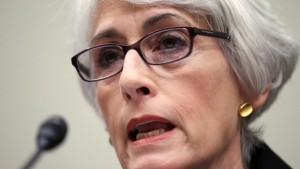 WASHINGTON (AP) -- The chief U.S. nuclear negotiator suggested Thursday that some U.S. allies and members of Congress hope diplomacy with Iran fails, offering a glimpse of the difficult task awaiting the Obama administration if it manages to secure a nuclear agreement with Tehran by a late November deadline.
WASHINGTON (AP) -- The chief U.S. nuclear negotiator suggested Thursday that some U.S. allies and members of Congress hope diplomacy with Iran fails, offering a glimpse of the difficult task awaiting the Obama administration if it manages to secure a nuclear agreement with Tehran by a late November deadline.Wendy Sherman, the undersecretary of state for political affairs, said negotiators are focused on clinching an accord that gives the world confidence that Iran's nuclear program is exclusively peaceful. In exchange, Iran would get significant relief from the international sanctions that have crippled its economy.
Significant hurdles remain, however. For the U.S., they include selling an agreement at home and to its closest regional partners.
"We are aware, of course, that this negotiating process is, shall we say, controversial," Sherman said in a speech at the Center for Strategic and International Studies.
"Some worry that it will fail. Others seem to fear that it will succeed. Many have questions and doubts," she said. "The Obama administration has consulted regularly with members of Congress and with our many overseas partners, including Israel and the Gulf states. We have heard a variety of concerns and done our best to answer hard questions."
The U.S. government has come out of those discussions with a reinforced conviction that diplomacy with Iran is worth the risk, Sherman emphasized.
The technical details of the talks have been closely guarded by the negotiating partners - the U.S., Britain, China, France, Germany, Russia and Iran - even if the broad parameters of a potential agreement are clear: Iran would have to cut back on its number of centrifuges enriching uranium and redesign a planned heavy water reactor so it doesn't produce plutonium. Both materials can be used in nuclear warheads. In exchange, the U.S. in particular would have to roll back some of the financial, trade and oil sanctions that significantly cut off Iran from global markets.
Congress could prove an obstacle in this regard, given threats by Democrats and Republicans to institute new sanctions if the deal isn't to their liking.
Negotiators want to conclude the talks by Nov. 24.
Sherman said talks have progressed at a "deliberative pace, which is diplo-speak for not so fast."
By The Associated Press
The Iran Project is not responsible for the content of quoted articles.










